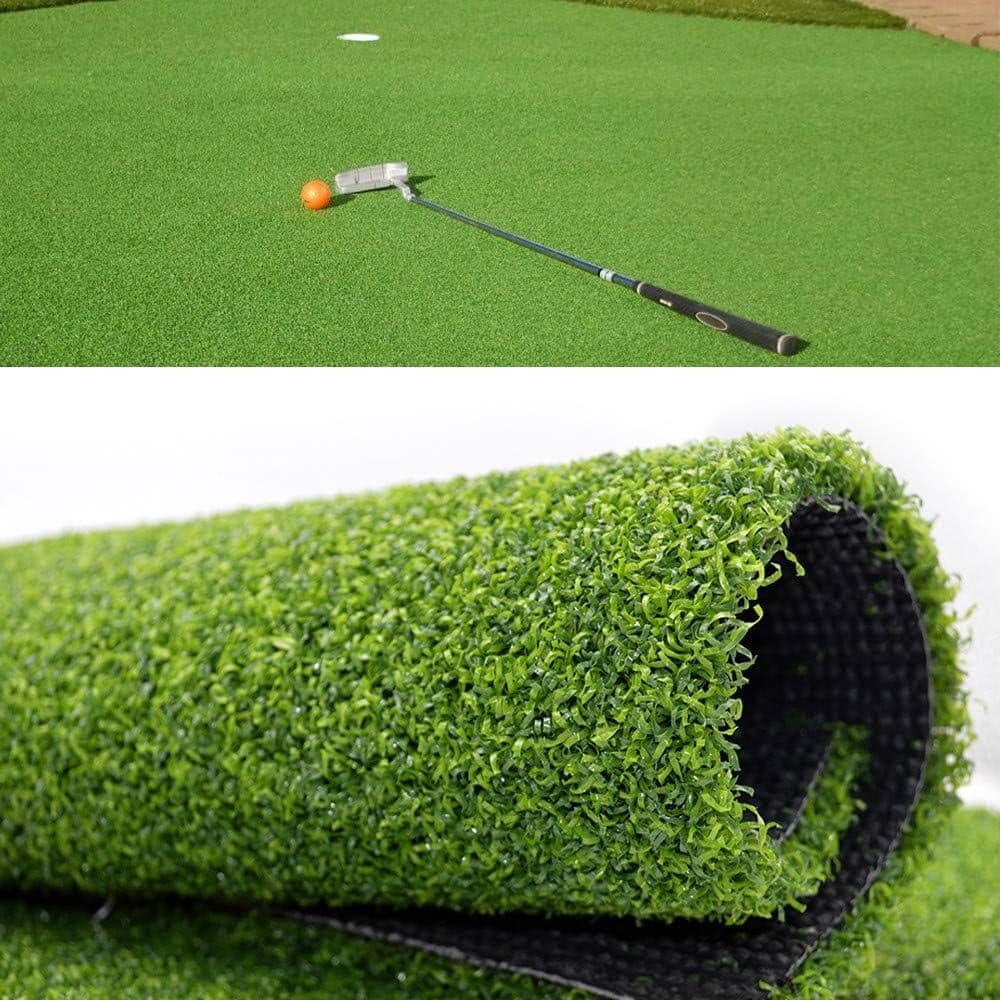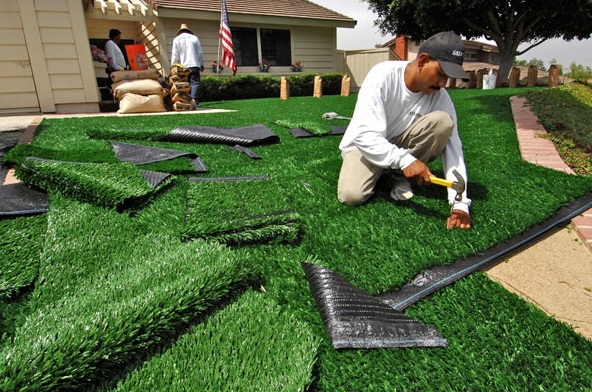Look Into the Environmental Conveniences of Opting for Artificial Grass Solutions
The adoption of artificial lawn options provides a compelling possibility to deal with pressing ecological difficulties. By considerably reducing water use and lessening the application of harmful chemicals, these alternatives not just promote sustainable landscaping yet likewise safeguard local communities. Moreover, the reduced carbon impact related to decreased upkeep tasks contributes to a more lasting method to land monitoring. Nonetheless, the ramifications of these advantages extend past plain conservation initiatives, raising concerns concerning their long-term influence on environment preservation and general eco-friendly equilibrium. Checking out these measurements exposes a complex interaction worth taking into consideration.
Water Preservation Perks
One of the most considerable advantages of artificial lawn is its capability to save water. In comparison, man-made turf does not require watering, substantially decreasing the overall need for water resources.
By eliminating the demand for regular watering, fabricated turf adds to sustainable landscape techniques and assists reduce the ecological influence of excessive water intake. Additionally, the conservation of water encompasses the decrease of runoff, which can bring about soil disintegration and river pollution.
Furthermore, the installation of synthetic grass allows towns and property owners to allocate water resources a lot more successfully, concentrating on essential uses such as drinking water and agriculture. The change in the direction of synthetic grass not only advertises liable water use but also lines up with wider ecological objectives aimed at protecting natural sources.
As communities increasingly prioritize sustainability, the water conservation benefits of man-made grass offer a compelling situation for its adoption in business and property landscape design jobs.
Lowered Chemical Use
The change to synthetic grass considerably reduces the reliance on chemical treatments generally made use of in all-natural lawn maintenance. Standard grass management usually includes the application of herbicides, plant foods, and chemicals to advertise development and control pests. These chemicals can position dangers to human wellness, regional wildlife, and the environment, adding to soil and water contamination.
In contrast, fabricated lawn gets rid of the requirement for these damaging compounds. By reducing the launch of synthetic compounds into the environment, man-made grass promotes much healthier soil and water systems.
Moreover, the absence of chemical overflow connected with synthetic grass setups helps shield regional waterways from air pollution, sustaining aquatic life and keeping biodiversity. Phoenix turf companies. As communities significantly prioritize sustainable techniques, going with synthetic grass offers a viable remedy that lines up with ecological conservation goals. Through this shift, homeowner can take pleasure in lavish environment-friendly spaces without compromising ecological health and wellness, leading the way for an extra lasting future
Reduced Carbon Impact

Furthermore, the installation of man-made lawn can cause significant water preservation. Natural grass require considerable amounts of water for irrigation, which not only adds to the carbon footprint linked with water removal and therapy yet additionally strains local water resources. In contrast, synthetic grass needs very little maintenance, needing no watering, consequently significantly decreasing water use and its linked energy expenses.
In addition, the longevity of synthetic grass adds to its lower carbon impact. With a life-span of up to 15 years or even more, the need for regular replacements is reduced, resulting in her explanation less waste and lower power usage in manufacturing and dealing with standard yard alternatives. Generally, synthetic grass presents a lasting choice for environmentally conscious landscaping.
Habitat Conservation
Environment conservation is a critical factor to consider in the discussion over landscape design selections, specifically when contrasting man-made grass to natural lawn. All-natural grass lawns frequently need substantial maintenance, including using fertilizers, chemicals, and herbicides, which can negatively influence regional environments. These chemicals can leach right into the soil and rivers, harming indigenous flora and fauna and disrupting regional habitats.
Man-made grass removes the demand for hazardous chemicals, thus securing close-by wildlife and preserving the stability of surrounding communities. The setup of synthetic turf can lead to the conversion of former grass locations right into even more biodiverse landscapes, such as pollinator yards or native plant areas, which can support local wild animals.
Inevitably, the change to fabricated grass not just saves water and decreases maintenance efforts but also fosters a more harmonious relationship between human activities and the Find Out More natural environment, promoting habitat preservation while doing so.
Long-Term Sustainability
Long-term sustainability is a vital consider assessing the advantages of artificial lawn over standard turf lawns. Among one of the most considerable benefits of synthetic grass is its toughness; it can last as much as 15-20 years with marginal upkeep, whereas natural grass needs regular reseeding and replacement. This long life lowers the requirement for constant sources, such as water, fertilizers, and pesticides, which are essential for keeping a healthy grass lawn.
Additionally, synthetic lawn adds to a decrease in carbon discharges linked with yard treatment devices. Traditional yards frequently call for gas-powered mowers, leaners, and blowers, every one of which add to air contamination. Phoenix turf companies. In comparison, synthetic grass eliminates the demand for such equipment, promoting a cleaner setting
Furthermore, the manufacturing of synthetic lawn increasingly uses recycled products, enhancing its sustainability account. As manufacturers embrace eco-friendly methods, the ecological footprint of synthetic grass continues to decrease.

Verdict
The adoption of synthetic grass remedies offers considerable environmental benefits, consisting of substantial water conservation, lowered dependence on hazardous chemicals, and a reduced carbon footprint. Fabricated grass help in preserving all-natural environments by reducing land disruption and advertising long-term sustainability with the usage of durable materials. Jointly, these factors highlight the possibility of synthetic grass to contribute favorably to ecological health and use a viable option to typical landscaping methods in an increasingly resource-conscious globe.
In contrast, man-made turf does not require watering, considerably lowering the overall need click here now for water resources. By minimizing the launch of artificial compounds right into the environment, fabricated turf advertises much healthier dirt and water systems.
Furthermore, the installation of synthetic grass can result in significant water preservation. In contrast, artificial turf needs very little maintenance, needing no watering, consequently substantially lowering water use and its linked power expenses.
